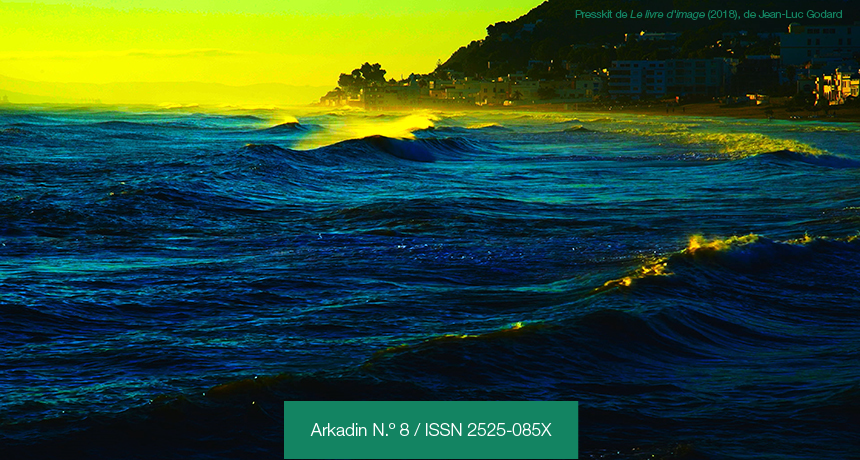Autobiographical Documentary. Interventions on the Family Archive
DOI:
https://doi.org/10.24215/2525085Xe002Keywords:
Archive, documentary, autobiographyAbstract
The article aims to explore the articulation of documentary, autobiography and family archives proposed by Javier Olivera in La sombra (2015). On the one hand, the study of this film will allow us to analyze the tendency to the inscription of the first person and the power of the filmmaker’s self within the framework of this essay with an autobiographical dimension. On the other hand, we will inquire the interventions made on family archives in order to promote a rewriting of history and a topographic transformation of family ties.References
Arfuch, L. (2010). El espacio biográfico. Dilemas de la subjetividad contemporánea. Ciudad Autónoma de Buenos Aires, Argentina: Fondo de Cultura Económica.
Arfuch, L. (2013). Memoria y autobiografía. Exploraciones en los límites. Ciudad Autónoma de Buenos Aires, Argentina: Fondo de Cultura Económica.
Bernini, E. (2004). Un estado (contemporáneo) del documental. Sobre algunos films argentines recientes. Kilómetro 111, (5), 41-58. Recuperado de http://kilometro111cine.com.ar/ensayo-3-extracto-12/
Bernini, E. (2008). Tres ideas de lo documental. La mirada sobre el otro. Kilómetro 111, (7), 89-108.
Chalfen, R. (1986). The Home Movie in a World of Reports [Las películas caseras en un mundo de reportes]. Journal of Film and Video, 38 (3-4), 102-111.
Derrida, J. (1997). Mal de archivo. Una impresión freudiana. Madrid, España: Trotta.
Foster, H. (2017). Malos nuevos tiempos. Arte, crítica, emergencia. Madrid, España: Akal.
Hirsch, M. (2019). Marcos familiares. Fotografía, narrativa y posmemoria. Ciudad Autónoma de Buenos Aires, Argentina: Prometeo.
Lins, C. y Blank, T. (2017). Films de familia, films amateur y la memoria del mundo. Arkadin, (6), 45-62. Recuperado de http://papelcosido.fba.unlp.edu.ar/ojs/index.php/arkadin/article/view/439
Olivera, J. (2015). La sombra [Película]. Argentina: Walden Productora Audiovisual.
Odin, R. (2007). El film familiar como documento. Enfoque semiopragmático. Archivos de la Filmoteca, (58), 196-217.
Piedras, P. (2014). Inflexiones del yo en el documental argentino contemporáneo: formas, influencias y categorías. En El cine documental en primera persona (pp. 62-98). Ciudad Autónoma de Buenos Aires, Argentina: Paidós.
Russo, E. (2017). La cuestión de los archivos: presencia y experiencia en el cine. En A. Rodríguez y C. Elizondo (Comps.), Tiempo archivado. Materialidad y espectralidad en el audiovisual (pp. 57-77). Ciudad Autónoma de Buenos Aires, Argentina: Universidad Nacional de Quilmes.
Zimmermann, P. (1995). Reel Families: A Social History of Amateur Film [Bobinas familiares: Una historia social del film amateur]. Bloomington, Estados Unidos: Indiana University Press.
Downloads
Published
How to Cite
Issue
Section
License
The acceptance of the manuscript by the magazine means the non-exclusive cession of the property rights of the authors in favour of the editor, who allows the reuse, after publication (post print), under a license Attribution-NonCommercial-NoDerivatives 4.0 International.
According to these terms, the material can be copied and redistributed by any means or in any format as long as a) the author and original source of the publication are quoted (magazine and URL of the work), access to the license is provided and whether changes have been made is mentioned; and b) the material is not used for commercial purposes.
The cession of non-exclusive rights means that after the publication (post print) in Arkadin the authors can publish their work in any language, means and format; in such cases it must be mentioned that the material was originally published in this magazine. Such cession also means the authorization of the authors for the work to be collected by SEDICI, the institutional archive of the Universidad Nacional de La Plata, and to be spread in the databases that the editorial team considers appropriate to increase the visibility of the publication and its authors.
Moreover, the magazine encourages the authors to deposit their productions in other institutional and thematic archives under the principle that offering the society the scientific and academic production without any restrictions contributes to a greater exchange of the global knowledge.
























